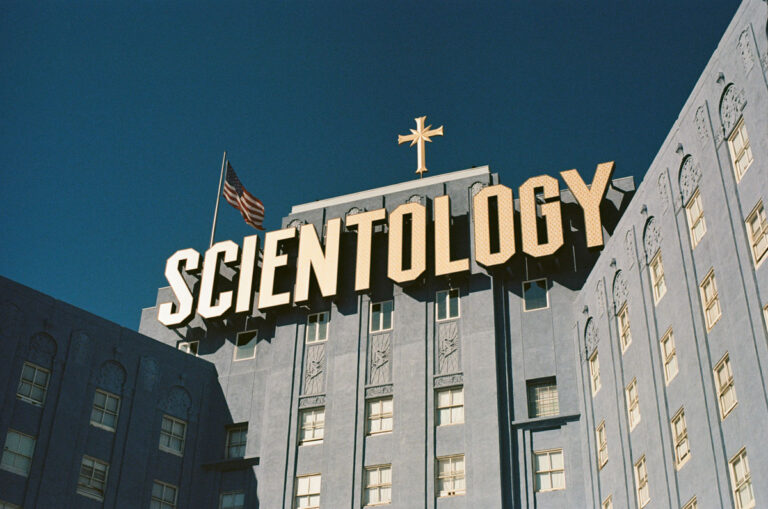The Church of Scientology: How it started and where it’s going
Aside from being a buzzword used in oh-so-many Twitter feuds or one of many memes taken from Tom Cruise interviews, Scientology still exists in many people’s minds as a slightly confusing and worrisome chapter. While most will have heard the countless stories of celebrity run-ins, the extravagant events and, of course, the church’s exclusive Celebrity Centre based smack bang in the middle of Hollywood, there’s much more to be said about this infamous religious organisation.
Most notably, its proven ability to place itself at the centre of modern-day online discourse and internet culture. So, in order to understand more about this global movement, we’ve broken it down into three of the most significant aspects of its influence.
1. The early beginnings of the Church of Scientology
The Church of Scientology was first brought into the public forum by founder L Ron. Hubbard in the mid-1950s. As of right now, according to the official Scientology website, there are more than “11,000 churches, missions and groups in 184 nations,” with its Churches also being held virtually in every major city. They claim their primary goal to be “true spiritual enlightenment and freedom for all.”
The Church has been under media scrutiny for decades. Alongside negative personal testimonies, some of the most scathing reports focus on a sub-section of the group named the Sea Organisation (or Sea Org).
The Church deems the Sea Org a collection of the “singularly most dedicated Scientologists,” those who have “committed their lives to the volunteer service of their religion.” However, in 2015, The Washington Post released an article wherein a previous member of the Church, Tracy Ekstrand, compared the group to the “marines in its rigorous discipline” and spoke at great length of the poor conditions she witnessed during her time within the cadre. As expected, the Church immediately disputed these accusations.
The internet undoubtedly proved an obstacle to the Church’s reputation and although journalists have been reporting on Scientology since the 1980s, online media quickly and massively disrupted the flow of information and catapulted new stories to the forefront. With all this in mind, strategies had to be re-evaluated. Succinctly put by The Atlantic, “the group has overwhelmingly entrusted its public-relations work to celebrities.”
2. Scientology in Hollywood
Scientology has without a doubt made a name for itself in Los Angeles’ glamourous entertainment industry, Hollywood. With its own Wikipedia page, the Church’s links to the inner sanctum of celebrity circles is relatively transparent. The biggest names to be publicly supportive of the Church are of course Tom Cruise, John Travolta and Elisabeth Moss. The Handmaid’s Tale star’s involvement with the Church has only recently become a highly sought after media story. During an interview with The New Yorker in May 2022, Moss divulged that her “godfather was a long-time Scientologist” as well as her parents.
She went on to say how “it’s not really a closed-off religion. It’s a place that is very open to, like, welcoming in someone who wants to learn more about it. I think that’s the thing that is probably most misunderstood.” Rounding up the interview, the actress was asked how she felt Scientology had helped her while growing up. She responded with communication, “The power of just being able to listen to somebody, of making somebody feel heard, of not belittling them for what they think or believe, even if you think it’s wrong.”
With Moss and so many other global stars publicly praising Scientology’s methods and teachings, the Church’s enthusiasm for these personalities as spokespeople is unsurprising. However, with a competing list of celebrities coming forward with their own negative portrayals of the Church, such as Leah Remini and Laura Prepon, it seems like the time has come for the organisation to revisit its public relations game plan.
3. Scientology at home
With so much focus on how Scientology fits into celebrity culture, the massive influence it has on ordinary people within online spaces is often overlooked. For example, Reddit’s r/scientology has over 32,800 members. Within the page, topics range from questions on how members are able to move up the ranks to management positions to Scientology-themed music recommendations. There are also personal anecdotes about connections to the Church and conspiracy theories about lead ranking members. Overall, it’s an overwhelming stream of information posted by members of the public who feel compelled to discuss this particular topic.
Naturally, TikTok also has its own piece of the pie. Towards the end of 2021, Rolling Stone featured an article about a TikTok video that was trending at the time. In the clip, 22-year-old Jordana Victor was seen jokingly filming herself completing a Scientology personality test to see how compatible she was with the religion and its teachings.
In a bizarre twist of fate, the Church subsequently “embraced the video” with one member “posting that it had led to several hundred OCA tests being submitted to German Scientology centres,” as reported by Rolling Stone. In this instance, the video-sharing platform indirectly aided the Church’s recruitment process.
A number of other creators have contributed to online discourse surrounding the Church of Scientology. @Reckless_ben has made a number of videos on the organisation. Most significantly, he’s posted content of him secretly filming Church meetings with “spy camera glasses.” Even more recently, the host of a popular true-crime podcast The Red Room posted a TikTok which has had almost 50,000 views detailing her experience of the Church indirectly reaching out to her after she interviewed a former member and wrote an article detailing that encounter.
@redroompod I’m being monitored by #scientology 👀 #culttok #podcast #storytime #xcy
♬ original sound - Jenny Claffey
Whether through fascination or fear, Scientology’s reach is undeniable. Its influence both in Hollywood and online is obvious and yet completely unpredictable. There are so many more questions to be asked with regards to this group, most importantly, what will it do next? And how will the rest of the world respond?






